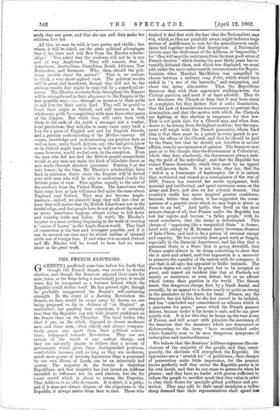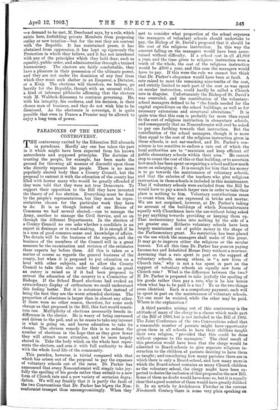THE FRENCH ELECTIONS.
GAMBETTA predicted some time before his death that though the French Senate was elected by double election, and though the Senators enjoyed their seats for nine years, so far from being a reactionary power, it would some day be recognised as a fortress behind which the Republic could shelter itself. He has proved right, though he prcbably exaggerated the Senate's self-sustaining strength. In the event of a !Jacobin Revolution the Senate, we fear, would be swept away by decree, no one being prepared to die in defence of " so illogical " an institution ; but pending that cataclysm, it is certainly true that the Republic can rely with greater confidence on the Senate than on the Chamber. The local bodies who elect it are, on the whole, disposed to choose moderate men, and these men, often elderly and always compara- tively grave, are, apart from their political convic- tions, indisposed towards Revolution. They are not certain of the result of any radical change, and they are naturally unable to believe that a system of government which gives them distinguished positions, comfortable incomes, and, so long as they are moderate, much more power of revising legislation than is possessed by our own House of Lords, can be an inherently bad system. The majority in the Senate is therefore Republican, and that majority has just issued an Address intended to influence not its own electors, but the far looser crowd which is about to return the Deputies. That Address is an able document. It is short, it is pithy, and if it does not always dispose of the objections to the Republic, it always meets them face to face. Those who drafted it deal first with the fear that the Nationalists may win, which, as they are painfully aware, might induce a large section of indifferents to vote for the miscellaneous candi- dates tied together under that description. A Nationalist victory, says the draftsman of the Address, is "impossible," for " they willmeet the resistance from the keen good sense of French electors " which during the past thirty years has in- variably defeated them, and which was displayed, we must add, under the most unfavourable circumstances for Repub- licanism when Marshal MacMahon was compelled to choose between a military coup d'e'tat, which would have ended in " a war of the barracks," and resignation, and chose the latter alternative. Then the Republican Senators deal with their opponents' stalking-horse, the Clerical question, and meet it at least adroitly. They do not denounce the Church or deny that it may have cause of. complaint, but they declare that it seeks domination, that the Law of Associations was necessary to prevent that domination, and that the motive with which the Clericals are fighting at this election is vengeance for that law. That is not quite fair, for a Church may, and often does, desire to be strong from the highest motives; but the argu- ment will weigh with the French peasantry, whose fixed idea is that there must be a priest in every parish to per- form the offices of the Church, and that he should be paid by the State, but that he should not interfere in secular affairs, even by an expression of opinion. The Senators next pass on to the charges that the Government is Collectivist, which they deny absolutely, the Government always seek- ing the good of the individual ; and that the Republic has ruined France financially, which they meet by an appeal to well-known facts. It is not true, they say, that the " deficit is a forerunner of bankruptcy, for it is certain that, mutilated and ruined as a consequence of the war of 1870, France has renewed her entire equipment, both material and intellectual, and spent enormous sums on the Army and Navy, and also on her colonial domain.. Our country's credit has never inspired greater confidence, because, better than others, it has supported the conse- quences of a general crisis which we may hope is about to come to an end." And lastly, they dwell on the most serious charge of all, that France under the Republic has lost her repute, and become " a fallen people," with its usual correlative, that the Army is dishonoured. This charge of " appearing like a vanquished State " is formu- lated with energy by M. Doumer, lately Governor-General of Indo-China, and said to be a person of unusual energy and capacity. He has certainly done good work at Saigon, especially in the financial department, and his idea that a quiescent State is a State that is going downhill, that France ought always to be doing something to show that she is alive and armed, and that expansion is a necessity to preserve the equality of the nation with its compeers, is one that in all ages has appealed to Gallic instincts. The French desire not only to be great, but to be accepted. as great, and regard an incident like that at Fashoda not merely as resistance, or even defeat, but as an affront which lowers their position in the world. The Senate meets this dangerous charge, first, by a blank denial, and secondly, by an appeal to a desire nearly or quite as strong in the peasantry as the desire for fame. France, say the Senators, has not fallen, for she has ceased to be isolated, and has "concluded and consolidated an alliance which is a guarantee for peace," peace which the French peasant desires, because under it his house is safe, and he can grow quietly rich. It is for this that he keeps up the vast Army of France, and will accept with pleasure the assurance of the Senators that the measures which are denounced as dishonouring to the Army " have re-established order where formerly were to be seen dangerous symptoms of indiscipline and insubordination."
We believe that the Senators' Address expresses the con- clusions of the majority of the people, and that, conse- quently, the elections will strengthen the Republic. Its opponents are a " scratch lot " of politicians; their charges of persecution make little impression, for the peasant knows perfectly well that under the Republic power is in his own hands, and that he can cease to persecute when he pleases ; and they have no leader with genius sufficient to induce the people to sacrifice much that they value in order to obey their desire for specially gifted guidance and pro- tection. They may add to their usual mandates a rather sharp demand that their representatives shall spend less —a demand to be met, M. Deschanel says, by a rule, which exists here, forbidding private Members from proposing outlay or new taxation—but for the rest they are content with the Republic. It has maintained peace, it has abstained from oppression, it has kept up rigorously the Protection in which they believe, and it has not interfered with any of the principles which they hold dear, such as equality, public order, and administration through a trained bureaucracy. The electors are fairly comfortable, they have a pleasure in their possession of the ultimate power, and they are not under the dominion of any fear from which they must seek shelter in an Emperor, a Dictator, or a King. The elections will therefore, we believe, go heavily for the Republic, though with an unusual rider, a, kind of informal pl6biscite affirming that the electors wish M. Waldeck-Rousseau to continue governing. He, with his integrity, his coolness, and his decision, is their chosen man of business, and they do not wish him to be dismissed. As the electorate is sovereign, it is quite possible that even in France a Premier may be allowed to enjoy a long term of power.











































 Previous page
Previous page